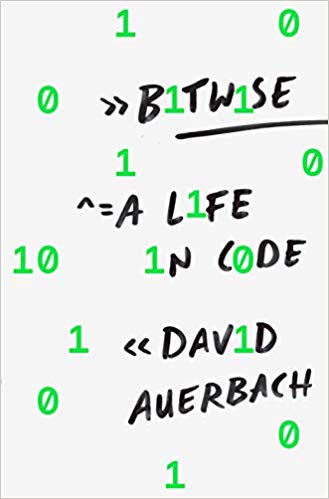
Bitwise
A Life in Code
- اطلاعات
- نقد و بررسی
- دیدگاه کاربران
نقد و بررسی

June 15, 2018
"We don't think right for our world today," writes programmer and technology writer Auerbach--and putting computers to work solving that fundamental problem is not a panacea.Computers are tools, and while they may one day outthink us, inaugurating what futurists call the singularity, they're still tools that can reinforce our human limitations even as they help us to work around them: "if we feed them our prejudices, computers will happily recite those prejudices back to us in quantitative and seemingly objective form," even making our prejudices seem rational. An early employee at both Microsoft and Google, Auerbach is the rare engineer who is also conversant with literature and philosophy, both of which he brings to bear on interpreting his experiences as a builder of these thinking machines and the heuristics and languages that guide them. In that work, design is everything. One of the author's asides, which fuels a central theme, concerns the Diagnostic and Statistical Manual of Mental Disorders, which, several editions on, has mutated from its initial goal of standardizing how psychiatrists diagnose disorders to a complex reference for "physician diagnosis, actuarial insurance practices, longitudinal research studies, drug regulation, and more." Just so, our machines are deficient in many ways, as with Google's effort to scan millions of books into a Library of Babel that is, in fact, a mess, so that the "heaps of code" thus amassed are best used as approximations rather than trustworthy models. In this matter, he adds, "Google is a dumb god." Interestingly, Auerbach brings his discussion to a close by counseling that we not worry too much about what, say, big technology companies are planning to do with our data. "At companies like Google or Facebook," writes the author, "programmers engage with people's personal information in such a way that they are indifferent to its implications." That should make the techno-anxious feel a little better--until the machines think better and take over.An eye-opening look at computer technology and its discontents and limitations.
COPYRIGHT(2018) Kirkus Reviews, ALL RIGHTS RESERVED.

July 1, 2018
Auerbach's first book offers both a fascinating insider view of the early days of Microsoft and Google and a warning of big tech's desire to hoover any and all data we allow them to consume. As a programmer for Microsoft and Google, the author recounts firsthand experiences of the inner workings of two of today's tech giants. He argues against the computational use of encoding and labeling of data, predicting the taxonomic labels used to classify personal aspects of information leads to assignments we cannot change. The seemingly innocuous data we share with online platforms we believe to be benevolent may in fact behave in ways hazardous to the world as we know it. Auerbach argues convincingly that systems that record and analyze our data have the potential to shape our online and offline experiences, yet he writes too many tangents offering perspectives on gaming, nerd culture, and parenting. VERDICT A critical warning from a programming expert on computation's ability to shape our lives. Readers of first-person accounts of tech's coming of age will appreciate this insider point of view.--Nancy Marksbury, Keuka Coll., Keuka Park, NY
Copyright 2018 Library Journal, LLC Used with permission.

August 20, 2018
With wit and technical insight, former Microsoft and Google engineer Auerbach explains how his knowledge of coding helped form him as a person, at the same time showing how coding has influenced aspects of culture such as personality tests and child-rearing. Auerbach is a natural teacher, translating complex computing concepts into understandable layman’s terms. The anecdotes from the engineering front lines are some of the most entertaining sections, especially when he recounts the rivalry between MSN Messenger Service (which he worked on) and AOL Instant Messenger, and considers Google’s evolution (“Everything was bigger at Google than it had been at Microsoft”). Connections to specific literary and philosophical works stretch a reader’s patience, and lengthy asides into coding parallels in Advanced Dungeons and Dragons and early text-based video games will entertain gamers but require too much explanation for the uninitiated. That said, his observations on child-raising are written with such charm that they’ll resonate with readers (he would play “Flight of the Valkyries” when his daughter tried walking because “her struggle and determination reminded me of the triumph I felt on getting a particularly thorny piece of code to work correctly”). The coding details aside, this book is an enjoyable look inside the point where computers and human life join.




دیدگاه کاربران